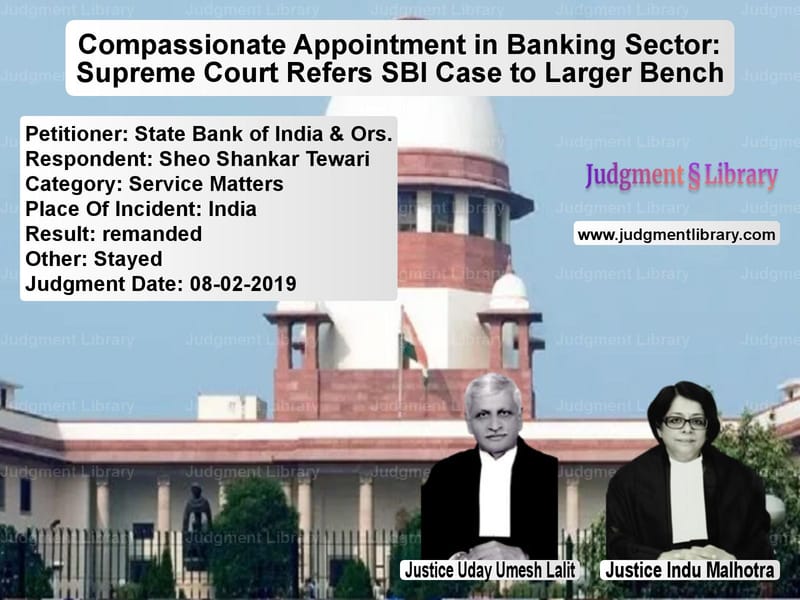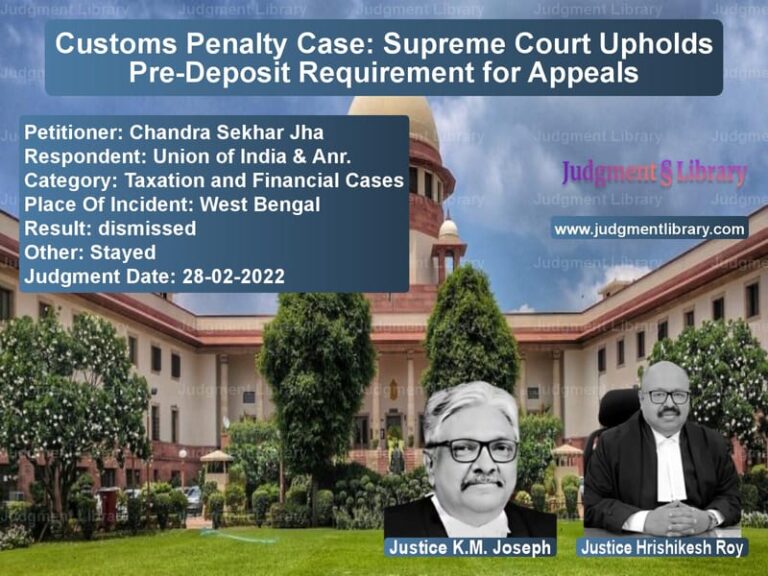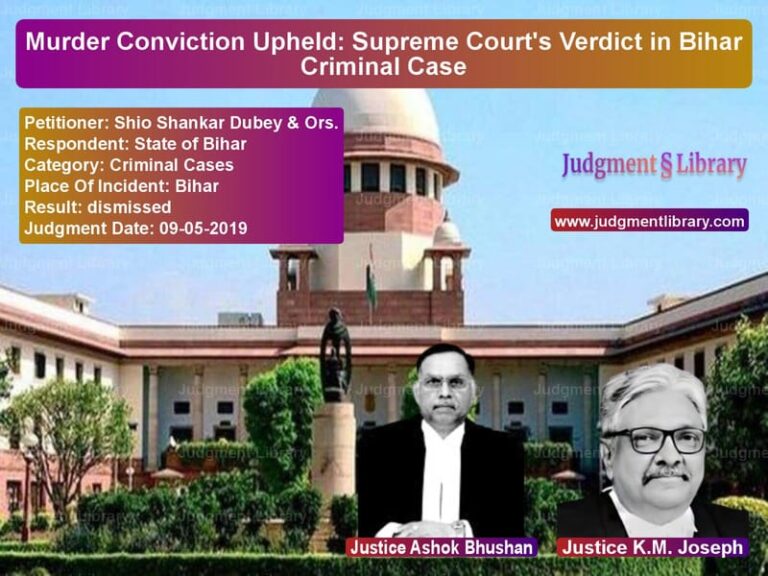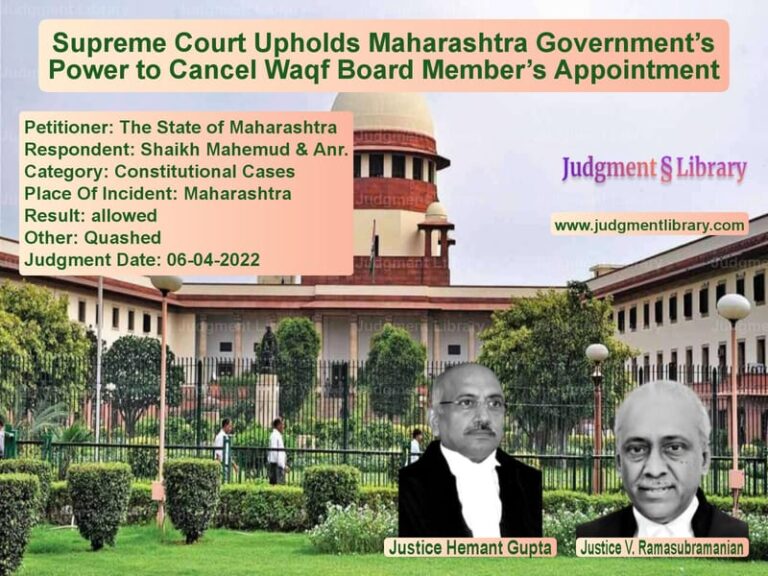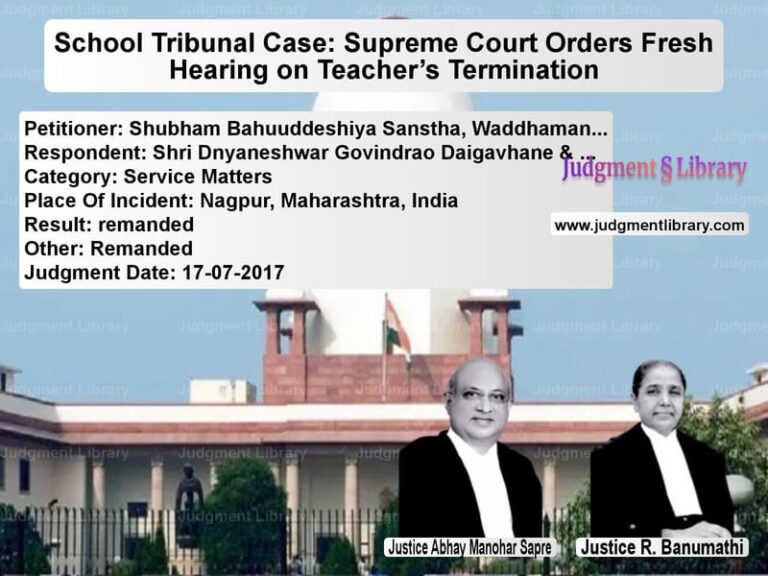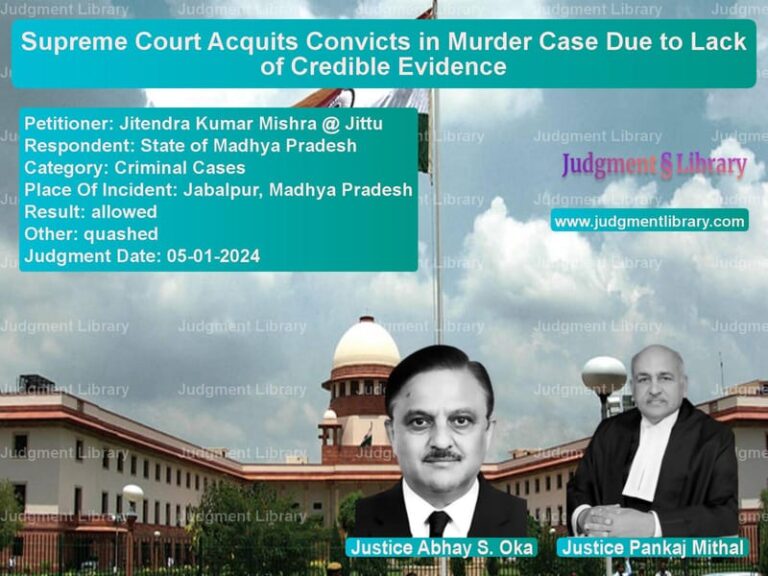Compassionate Appointment in Banking Sector: Supreme Court Refers SBI Case to Larger Bench
The Supreme Court of India recently referred an important case concerning compassionate appointment in the banking sector to a larger bench, citing inconsistencies in previous rulings. The case, State Bank of India & Ors. v. Sheo Shankar Tewari, involves the question of whether the policy applicable at the time of the employee’s death or the policy in force at the time of application consideration should determine the eligibility for compassionate appointment.
Background of the Case
The case arose when Sheo Shankar Tewari, the respondent, applied for a job under the compassionate appointment scheme after his father, an SBI employee, passed away on November 11, 2004. At the time of his father’s death, SBI had a policy that allowed compassionate appointments for dependents of deceased employees. However, before Tewari’s application could be processed, SBI adopted a new scheme on August 4, 2005, which abolished compassionate appointments and replaced them with a one-time ex-gratia payment.
Due to this policy change, SBI rejected Tewari’s application. Tewari challenged this decision in the High Court, arguing that his application should be considered under the old policy, which was in effect when his father passed away.
Legal Issues in the Case
- Should the scheme applicable at the time of the employee’s death or the scheme in effect when the application is considered determine eligibility?
- Do applicants for compassionate appointments have a vested right under the policy in place at the time of death?
- Can a bank unilaterally alter its policy and deny benefits that were previously available?
Arguments of the Parties
Petitioners: State Bank of India
- The bank argued that the August 4, 2005 scheme, which abolished compassionate appointments, should apply to all pending applications, including Tewari’s.
- The bank relied on the Supreme Court’s decision in State Bank of India v. Raj Kumar (2010), which ruled that once a scheme is abolished, all pending applications under the old scheme automatically lapse.
- Compassionate appointments are not a right but a concession, and the employer has the discretion to modify or withdraw the scheme based on financial and operational considerations.
Respondent: Sheo Shankar Tewari
- Tewari argued that his application should be considered under the policy in effect at the time of his father’s death.
- He cited Canara Bank v. M. Mahesh Kumar (2015), where the Supreme Court ruled that an applicant’s claim must be considered under the policy in force at the time the cause of action arose, i.e., the employee’s death.
- Since his father passed away before the new policy came into effect, his application should not be subject to the subsequent policy change.
Supreme Court’s Observations
The Court noted that there were two conflicting lines of precedent:
- In SBI v. Raj Kumar (2010) and MGB Gramin Bank v. Chakrawarti Singh (2014), the Court ruled that the scheme applicable at the time of consideration governs the case, not the scheme at the time of death.
- In Canara Bank v. M. Mahesh Kumar (2015), the Court ruled that the scheme in effect at the time of the employee’s death should apply.
Recognizing this inconsistency, the Supreme Court held:
“The principles emanating from these two lines of decisions are not consistent and do not reconcile. The matter therefore requires consideration by a larger Bench of at least three Hon’ble Judges of this Court.”
Final Verdict
The Supreme Court referred the case to a larger bench for authoritative determination. The key directions were:
- The case should be placed before the Chief Justice of India to constitute a three-judge bench.
- The larger bench would decide which legal principle should govern compassionate appointments.
- Until then, the decision in the present case remains pending.
Key Takeaways from the Judgment
- Conflicting Precedents: The Supreme Court identified and acknowledged inconsistencies in previous rulings regarding compassionate appointments.
- Judicial Review of Employment Policies: The case raises critical questions about the rights of dependents of deceased employees and the scope of employer discretion.
- Potential Impact: The outcome of the larger bench’s decision will set a precedent for all pending and future compassionate appointment cases in the banking sector and beyond.
Conclusion
The Supreme Court’s decision to refer the case to a larger bench highlights the complexity of compassionate appointment policies. The ruling will have significant implications for the dependents of deceased employees and banking institutions. By addressing the inconsistencies in past judgments, the Court aims to establish a clear and uniform legal standard for such appointments in India.
Petitioner Name: State Bank of India & Ors..Respondent Name: Sheo Shankar Tewari.Judgment By: Justice Uday Umesh Lalit, Justice Indu Malhotra.Place Of Incident: India.Judgment Date: 08-02-2019.
Don’t miss out on the full details! Download the complete judgment in PDF format below and gain valuable insights instantly!
Download Judgment: State Bank of India vs Sheo Shankar Tewari Supreme Court of India Judgment Dated 08-02-2019.pdf
Direct Downlaod Judgment: Direct downlaod this Judgment
See all petitions in Employment Disputes
See all petitions in Public Sector Employees
See all petitions in Recruitment Policies
See all petitions in Judgment by Uday Umesh Lalit
See all petitions in Judgment by Indu Malhotra
See all petitions in Remanded
See all petitions in Stayed
See all petitions in supreme court of India judgments February 2019
See all petitions in 2019 judgments
See all posts in Service Matters Category
See all allowed petitions in Service Matters Category
See all Dismissed petitions in Service Matters Category
See all partially allowed petitions in Service Matters Category

